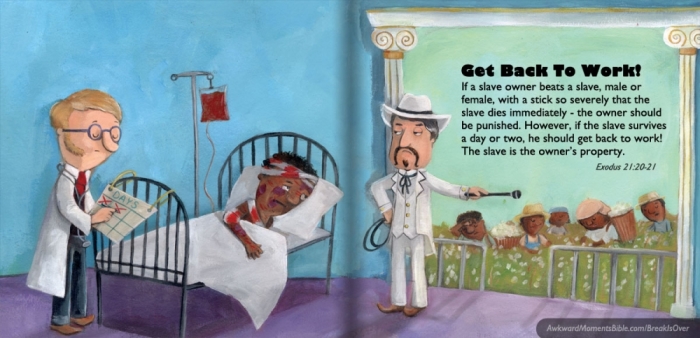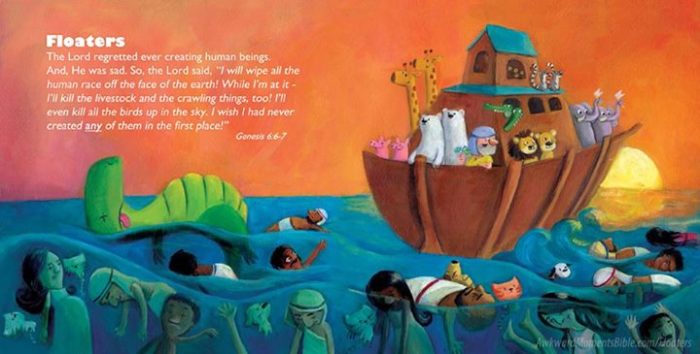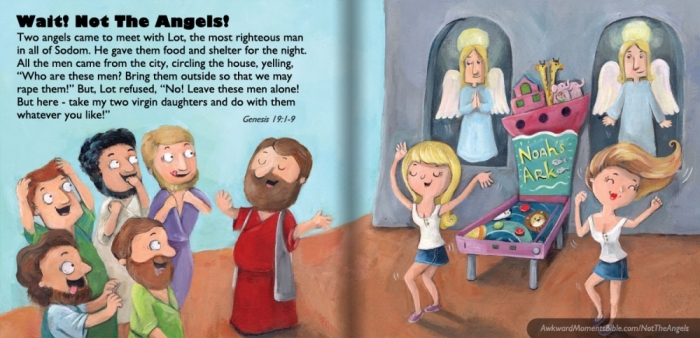New Bible Book Is 'Awkward' on Purpose; Illustrations Meant To Stir Critical Thinking
Despite its title and seemingly playful illustrations, the intended audience of The Awkward Moments Children's Bible is not simply boys and girls. Rather than offering familiar Old and New Testament stories alongside colorful depictions of Jesus, Moses, Noah and David, the book contrasts some of Bible's most controversial, strange, and violent verses alongside cheerfully jarring and dramatic pictures.

According to author Horus Gilgamesh, one of the goals behind these provocative juxtapositions is to encourage more Christians to critically think about the Bible.
"Frankly what it comes down to is we want people to think about the Bible for themselves, not just going to church once a month or once a week and nodding their head and cherry-picking and taking things out of context," Gilgamesh told The Christian Post.
According to Gilgamesh, many Christians know little about their own faith, pointing to a 2010 Pew study that showed that 55 percent of American Christians could not name the writers of the four Gospels as evidence. Instead, the author claimed, many over-rely on churches and sermons to explain the Bible to them, without doing their own spiritual homework,
"[The illustrator and I] take things out of context from the illustrations' perspective, but have the verses right there and we try to do toe a very narrow line between being respectful but also getting people out of their comfort zone to go look up the Bible verse themselves and look up the context themselves."

Gilgamesh, whose psuedonym is part-Egyptian God and Uruk royalty, is a self-proclaimed "absolute hope-filled agnostic" who was raised in a Catholic home. After he became a "born-again" Christian in college, he spent years immersed in the "Evangelical world" working domestically and abroad for 10 years in "full-time ministry programs doing Biblical literacy and evangelism…and [pertaining to] AIDS and drug issues."
It was during his time overseas that Gilgamesh became increasingly disillusioned with his faith.
"We seemed more interested in putting Bibles in people's hands than we were in feeding them or fixing them," said Gilgamesh. "We were doing a lot of partnerships with humanitarian organizations that were providing food, water, and medicine, which is fantastic, and we often got in the way or screwed up how funding was working because of our emphasis on Bible and evangelism."
Despite his departure from Christianity, Gilgamesh maintained relationships with individuals from his days in ministry, some of whom, including two pastors and a seminary student, collaborated with the author to start the project.
Originally a "private online gag" and "tongue-in-cheek irreverent conversation among a group of interfaith friends of pastors, students, atheists, doctorates in theology," Gilgamesh said illustrations, posted on Facebook "struck a nerve" with the atheist community.
The site does little to stave off controversy. One image illustrates a paraphrase of Mark 5:1-17, where a possessed man asks Jesus to remove the evil spirit controlling him and Jesus subsequently casts the demon out into a nearby herd of pigs who run off a cliff and kill themselves. A confused and angry group of people glare at Jesus while bloody pigs die on the rocks.
In another image, an illustration of Luke 19:27, which in the New International Version reads, "But those enemies of mine who did not want me to be king over them - bring them here and kill them in front of me," Jesus, with a crown of thorns on his head, is shown wearing a white turban and robe, while wielding a sword while recording himself talking to a videocamera.

Not surprisingly, the site has proved successful at also garnering the attention of Christians, many of whom were initially outraged at the Awkward Bible's depiction of the Bible and Christ. But Gilgamesh said that many atheists and Christians stayed on the site and ultimately began having conversations with one another.
"What was interesting to see over a six month period was how many of those people stayed to listen and have conversations, so it was no longer an argument but a conversation and realize that we're not trying to fight. We're not trying to tell you you're wrong for believing this. We just want people to understand where those beliefs lie," said Gilgamesh.





























